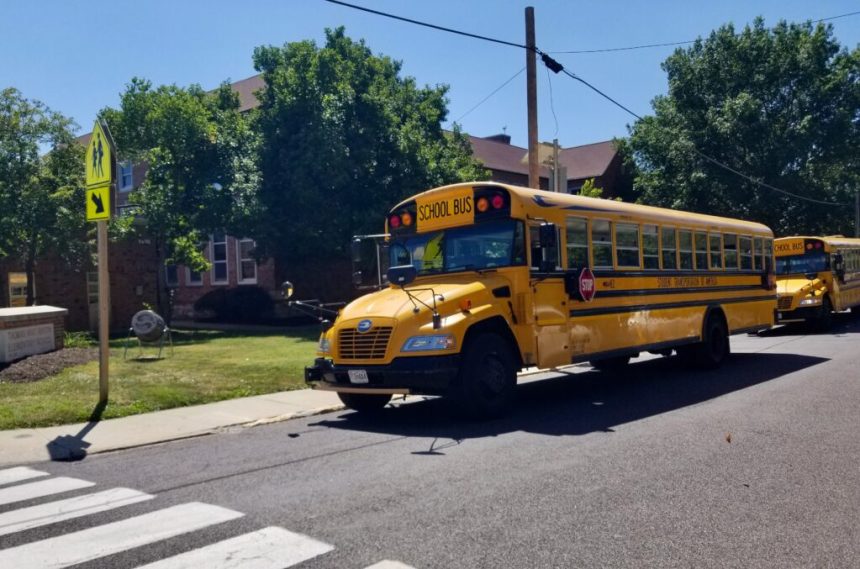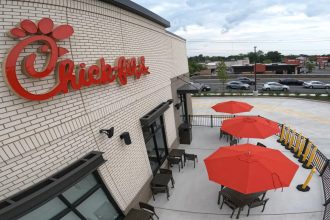School buses wait in 2021 outside Thomas Hart Benton Elementary School in Columbia (Rudi Keller/Missouri Independent).
The first charter school in Columbia could become a reality in the near future depending on the outcome of a review Thursday by the Missouri Charter Public School Commission.
Job Point, a long-established career training and employment center in Columbia, submitted a letter of intent and proposal to the commission. It hopes for the green light to begin working toward a public charter school focused on workforce-related skills.
A YouthBuild-Workforce Charter School would follow Job Point’s mission of linking people to jobs through career planning and vocational training. If approved, the school would likely not open until fall 2027. It would serve students 17 and older.
Charter schools are independent public educational institutions that are free of some regulations that might apply to traditional public schools. They have been an option in Missouri since 1998, and 81 charter schools are currently operating in St. Louis and Kansas City.
In 2024, the Missouri General Assembly passed a law to allow charter schools to legally operate in Boone County despite opposition from Columbia Public Schools and other school districts in the county.
Funding is a major concern for many of those opposed to charter schools. While charter schools don’t take money directly from public school districts, they are funded by taxpayer dollars.
Charter schools and Job Point
Charter schools typically seek to meet a specific community need that may not offered at other schools, such as art, science and technology or vocational training.
The proposed charter school would follow the model of Job Point’s YouthBuild program, which has been established in Columbia for 22 years.
The program is designed to help 16- to 24-year-olds get their high school equivalency and workforce training after dropping out of high school, said John Scalise, president and CEO of Job Point in Columbia.
Nine trade programs are offered by YouthBuild in Columbia. The programs can help youth to get their drivers license, teach them to build homes and offer paid internships in Columbia.
YouthBuild receives funding through a Department of Labor federal grant, although that will cease in 2028.
“With the YouthBuild federal dollars going away, we’re looking for a way to continue our program,” Scalise said. “It’s been a value to the community, so we’re hoping that we can find ways to continue that.”
Noah Devine, executive director of the Missouri Charter Public School Association, said a charter school could support students who are struggling.
“This is a critical way that will permit Job Point to be able to serve more students who might be struggling in the more traditional setting and getting them on a path to a living wage job,” Devine said.
“Job Point is seeing a different way to meet an increasing need for kiddos experiencing homelessness, (or) not finding the right fit in the traditional school setting, (or) trying to find a living wage job,” Devine said.
The process
Establishing a charter school requires lengthy review and extensive paperwork.
The proposed charter school is just in the beginning stages. If the Missouri Charter School Commission approves its initial letter and prospectus, Job Point will be invited to submit an application, which would then undergo a more extensive review.
Unlike traditional public schools, which are held accountable by the Missouri Department of Elementary and Secondary Education, charter schools must also have a sponsor that monitors academic performance and progress.
Historically, the number of successful applications for establishing a charter school is small.
“Theoretically, they like the idea of the school,” said Jeff Rainford, spokesperson for the charter school commission. “But the devil is in the details. If they are invited, then it’ll be about if they can do what they actually aspire to do.”
It helps that YouthBuild has established charter schools in California and Illinois.
“There’s a model there,” Devine said. “They know what they do, and they do it well. They’re not just inventing something.”
The final step is submission to the Missouri State Board of Education. If approved by Jan. 31, the school can be opened in the fall of the same year.
“Job Point likely cannot meet that deadline for Jan. 31 of 2026,” Devine said. “So they would have to meet it in 2027 in order to open for the 2027-2028 year.”
Resistance from public schools
Even though nearly every school district relentlessly fought the idea, the state senator who represented the county was determined to allow charter schools in Boone County.
Just months before he left office, former state Sen. Caleb Rowden persuaded his colleagues to pass the bill.
“I want public education to be functioning, hitting on all cylinders,” Rowden said at the time. “I want those schools to be museums where people can go and get the best education that they can get anywhere in the world.”
For local school districts, the funding mechanism was a big sticking point.
“The No. 1 beef that the community should have with charter schools is that we did not approve that use of our tax dollars as a community,” said Suzette Waters, a member of the Columbia School Board.
Job Point would draw from an enrollment pool that already exists, she said, and money follows the student.
“It becomes unsustainable, and taxes would have to go up,” she added.
Additionally, Waters questioned the success of charter schools in general.
“More than 50% of them have closed,” she said. “Over the past 20 years, charters across the state have not shown to be any more effective at producing academic outcomes than their traditional neighborhood schools.”
Two YouthBuild charter schools have closed in St. Louis – one in 2002 and one in 2014, according to the St. Louis Post-Dispatch.
But, the YouthBuild Charter School of California “has graduated over 6,500 students since its founding, with a one-year graduation rate around 78%,” according to a news release from the Missouri Charter Public School Association.
Job Point’s target enrollment for its first year is 45 students in grades nine through 12.
Currently, through partnership between Columbia Public Schools and Job Point, five district students are involved in a Job Point job coaching program with space for 16, Waters said.
“We are beating the bushes and can find five children that want to take advantage of those services? There’s space for 16, and we can only find five,” Waters said.
The district already provides the Missouri Option Program for students 17 or older at risk of dropping out to earn a diploma, she said.
“Job Point is not coming up with something that we’re not already doing with great success,” Waters said. “We are already providing alternative programming and specialty support in Title I schools.”
Scalise has a different outlook about the way a Job Point charter school would fit into the Columbia community.
“When there is something new, you’re either focused on danger or opportunity,” Scalise said. “We are certainly focused on the opportunities that come with it.”
“Our goal,” Scalise said, “is to really continue to help people and our community, and provide opportunities to get from where they’re at to where they want to be on the career track.”
This story originally appeared in the Columbia Missourian. It can be republished in print or online.









